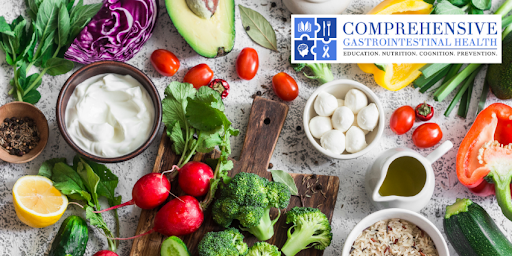CAN DIET REALLY TREAT CROHN’S DISEASE? YES!!

CAN DIET REALLY TREAT CROHN’S DISEASE? YES!!
By Jeffrey Nathanson, M.D.
For years, gastroenterologists have told patients that there is little if any role for diet in the treatment of Crohn’s Disease, other than avoidance of roughage in the diet during a flare. Exciting recent medical studies have begun to show that, despite conventional wisdom in the GI community, there is in fact scientific evidence to support the effectiveness of certain diets in the treatment of Crohn’s.
At the recent Crohn’s and Colitis Foundation of America Congress annual conference, Dr. James D. Lewis of the University of Pennsylvania presented data from a recent randomized clinical trial in which two diets – the Specific Carbohydrate Diet and the Mediterranean Diet – were both found to be effective in achieving clinical remission in patients with Crohn’s disease. At week 6, 48% of patients on the Mediterranean Diet and 49% of patients on the Specific Carbohydrate Diet were in clinical remission as defined by the Crohn’s Disease Activity Index.
The Specific Carbohydrate Diet is based on the theory that complex carbohydrates encourage the growth of unhealthy bacteria in the gut, which then produce byproducts that encourage inflammation. It is characterized by a high intake of unprocessed meat, poultry, fish, shellfish, and eggs; most vegetables no matter how they are prepared; most fruits and nuts; and avoidance of grains, dairy, and sweeteners other than honey.
The Mediterranean diet has a well-proven track record of showing benefits in reducing the risk cardiovascular disease, cancer, and all-cause mortality. Recent studies have also suggested a possible benefit in Crohn’s disease. It is characterized by a high intake of olive oil, fruits, vegetables, nuts, and cereals; moderate intake of fish, poultry, and wine; and limited intake of red and processed meats and sweets.
Although symptom improvement is a worthy goal of any treatment, ideally these diets would also improve objective markers of disease activity. As a secondary outcome, the above study also found that, at 6 weeks, 35% of the Specific Carbohydrate Diet group and 31% of the Mediterranean Diet group had at least a 50% reduction from baseline in fecal calprotectin – a stool test that reflects inflammation in the colon. In a different study presented at the same CCFA Congress, Dr. Arie Levine, professor at Tel Aviv University in Israel, reported that 62.5% of adult patients on the Crohn’s Disease Exclusion Diet – a similar whole foods diet designed to exclude or limit exposure to foods that may adversely affect the microbiome or alter intestinal barrier function – not only achieved clinical remission, but a significant number were also found to have an objective decrease in endoscopic inflammation on follow up colonoscopy.
It is important to note that the great majority of patients in both studies were also on medications to treat Crohn’s disease and in no way do these studies suggest diet should replace the central role of medical therapy in the management of Crohn’s. However, they do suggest that diet can complement medical therapy in the treatment of Crohn’s to better achieve health and well-being in this population.
If you are interested in learning more about these studies or the Crohn’s and Colitis Foundation of America (CCFA) – a tremendous resource for patients with inflammatory bowel disease, please go to www.ccfa.org. If you have Crohn’s disease and would like to make an appointment with one of IBD Physicians, Nurse Practitioner or Registered Dietitians, please contact us at 224-407-4400 or www.compgihealth.com.
